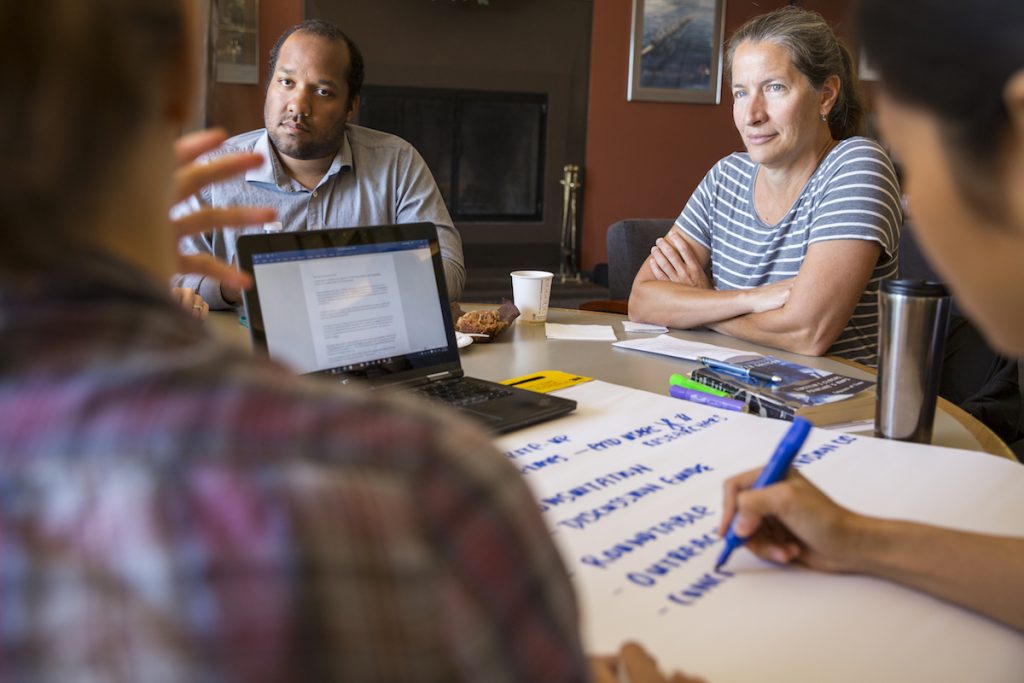
The Neuroethics research thrust at the Center for Neurotechnology (CNT) studies ethical issues arising from emerging neural engineering technologies. Issues include questions of privacy, security, moral and legal responsibility, changes in our understanding of agency (the capacity of individuals to act independently and make their own free choices) shifts in personal identity and social justice.
We have a commitment to the inclusion of disability perspectives in the design of devices intended to benefit people with disabilities. Our group does both theoretical research and writing, and empirical studies such as focus groups with intended end-users of neural engineering technology.
Our work consists of three principal activities:
• Education and outreach
• Research and scholarship
• Neuroscience and ethics engagement
Education and outreach
We contribute to the educational mission of the CNT through teaching, mentoring, and creating neuroethics content and guidelines at the University of Washington (UW) and at CNT partner institutions, San Diego State University (SDSU) and the Massachusetts Institute of Technology (MIT). We also engage in public and pre-college education outreach activities.
Highlights:
• Faciliating ethics roundtables at UW, MIT and SDSU
• Contributing to a panel discussion and public screening of the documentary “Fixed: The Science/Fiction of Human Enhancement“
• Partnering with the Northwest Association for Biomedical Research (NWABR) to talk with community members about perceptions of neural engineering.
• Working with the Momentum Program at MIT. This program offers minority students at MIT an interdisciplinary perspective on solving some of the world’s biggest challenges, and gives them the opportunity to explore brain-computer interface work at the CNT.
• Working with Upward Bound at the UW. Upward Bound assists high school students from economically disadvantaged backgrounds in their pursuit of a high school diploma and prepares them to enter and complete a post-secondary education program. The CNT works with Upward Bound to introduce students to neural engineering as a field of study and potential career.
Research and scholarship
We conduct empirical ethics research, such as surveys of people’s perceptions of neural technologies, and we conduct theoretical research that explores the social and ethical implications of neural technologies. Our published work aims to educate the public, researchers and policymakers, and our group mentors students pursuing projects in neuroethics, including those participating in summer programs and pursuing advanced degrees.
Highlights:
• Awarded $1.5 million BRAIN initiative grant to study the effects of brain-computer interface technology on perceptions of agency.
• Conducting focus groups with individuals who have disabilities and the general public, learning about their perspectives and views on brain-computer interfaces (BCIs), deep brain stimulation and other neural devices
• Surveying BCI scientists on their attitudes toward ethics and ethics engagement. See “Asilomar survey: researcher perspectives on ethical principles and guidelines for BCI research.”
• Collaborating with the Neuroethics Core at the University of British Columbia (UBC)
Neuroscience and ethics engagement
We work to integrate reflection on ethical implications of neuroscience and neural engineering into the structure and practice of science. Our ethicists work closely with neural engineering students and scientists at the CNT. This close collaboration includes embedding ethicists in labs to work collaboratively with researchers.
Highlights:
• Running an interdisciplinary neuroethics journal club (ongoing)
• Co-organizing an international consensus meeting to develop ethical priorities in neuroscience. See “Four ethical priorities for neurotechnologies and AI.”
• Conducting workshops on ethics engagement at neural engineering centers and conferences (ongoing)
For questions about Neuroethics at the CNT, please contact Sara Goering or Eran Klein.
